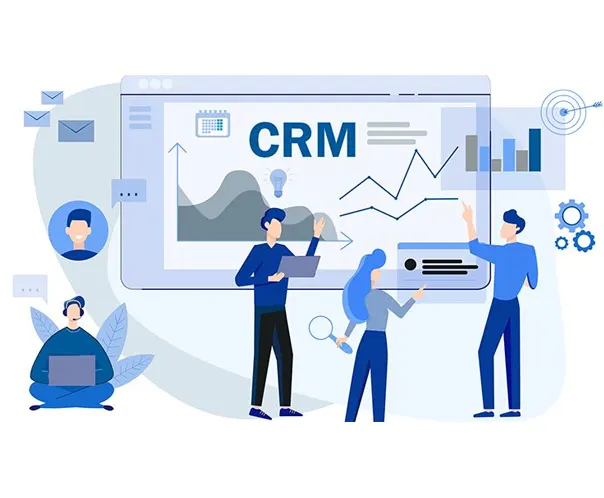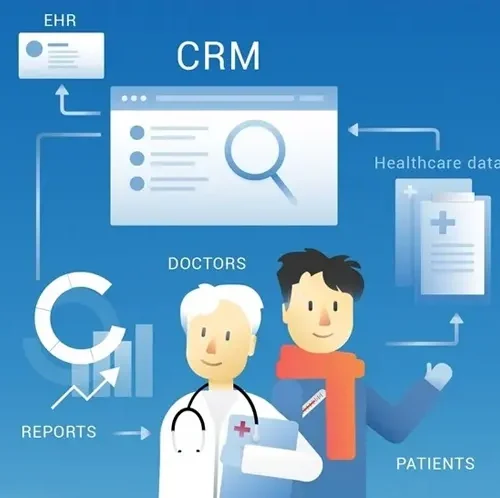Choosing to build your own CRM is a critical decision in business. Why? The importance of custom CRM software development is essential for accessing customer data, improving decision-making, driving sales, and facilitating personalized interactions with customers to drive better satisfaction.
Understanding the Significance of Custom CRM Software Development!
- Data-Driven Decision Making: Custom CRM software development empowers businesses to gain insightful customer data that can be leveraged to make informed decisions. By having a system that collects, analyzes, and interprets customer information effectively, businesses can navigate the decision-making process with confidence.
- Boosting Sales: A custom CRM system enables businesses to streamline their sales processes, track leads, and manage customer interactions more efficiently. This leads to increased productivity, better lead conversion rates, and ultimately, higher sales figures.
- Providing Business Insights: Custom CRM software development allows for the integration of advanced analytics tools, enabling businesses to gain valuable insights into customer behavior, preferences, and trends. This data-driven approach helps businesses identify opportunities, predict trends, and make strategic decisions to stay ahead of the competition.
- Executing Personalized Customer Interactions: Personalization is key to establishing meaningful connections with customers. Custom CRM software enables businesses to tailor interactions based on individual customer preferences, purchase history, and engagement levels. This personal touch helps in building customer loyalty and trust, leading to enhanced customer satisfaction and retention.
The Growing Demand for Custom CRM Solutions!
The growing importance of personalized customer experiences has fueled the demand for custom CRM solutions. According to STATISTA projections, the global CRM software market is expected to reach $57 billion by 2025. There is an estimated increase of almost four billion U.S. dollars compared to 2021, with a CAGR of 2.1 percent, showcasing a steady growth rate driven by businesses’ need to deliver exceptional customer experiences.
Key Considerations for Custom CRM Development!
Before entering the adventure of designing and building a custom CRM software, businesses need to consider several key factors:
- Identifying Required Features: Define the essential features and functionalities your custom CRM software needs to have to meet your business objectives effectively.
- Design Specifications: Determine the user interface design, navigation structure, and overall user experience to ensure your custom CRM software is intuitive and user-friendly.
- Cost Analysis: Discuss the custom CRM software development cost with a reliable tech partner like Maven Technology to get a comprehensive estimate and avoid unforeseen expenses.
Spending your hard-earned money on custom CRM software development is a strategic business decision that offers a wide range of benefits, from data-driven insights to personalized customer interactions. By embracing tailored CRM solutions, businesses can enhance customer relationships, drive sales growth, and gain a competitive edge in today’s dynamic market environment.
What is a CRM system?
Furthermore, CRM software allows management to streamline the entire business process by leveraging strong and personalized relationships with your customers to help them meet satisfaction levels and help you as well to grow your business.
Beyond Customers – Built-In CRM System for Stronger Relationships!
Customer Relationship Management (CRM) software has revolutionized business processes by implementing strategic interaction with business customers. However, the scope of CRM expands far beyond just managing customer relationships. It involves building connections with colleagues, suppliers, service users, and customers, creating an exhaustive business ecosystem of relationship management.
A. A Central Hub for All Relationships!
At its core, a CRM system provides a centralized repository or singular storage location for sharing contact information. It ranges from customers and prospects to colleagues and service users. This allows for easy access and exchange of information, fostering collaboration and streamlining communication within an organization.
B. Tracking Interactions for Enhanced Engagement!
One of the most significant advantages of a CRM system is its ability to track interactions and engagement history. Each phone call, email, meeting, presentation, or inquiry can be recorded and analyzed. This level of interactivity tracking system enables businesses to gain valuable insight and reference into past interactions, helping them understand customer preferences and needs better.
C. Personalization and Relevance!
With a CRM system in place, businesses have access to comprehensive customer profiles that include every interaction detail. This wealth of information ensures that every customer contact is personalized and relevant, and keeps management updated. By understanding customers on a deeper level, cross-selling and up-selling opportunities become evident, providing a chance to expand business with existing customers.
D. Streamlining Workflows and Maximizing Opportunities!
Aside from tracking contact histories, a CRM system enables businesses to add notes, schedule follow-ups, and plan the next steps that need to be taken. This functionality ensures that no opportunities are missed, allowing businesses to close deals efficiently and grow customer accounts.
By leveraging CRM systems, businesses can drive greater engagement, personalize interactions, and open growth opportunities. With comprehensive insights and streamlined workflows, organizations can build and nurture meaningful relationships that contribute to long-term success.
How many types of CRM Systems?
Let’s explore the different types of CRM Systems!
Customer Relationship Management (CRM) systems play leads and deals in managing and nurturing relationships with customers. They help your businesses track leads and add info about your customers, which is precisely incorporated into your business interactions to finalize deals and streamline customer journeys more satisfactorily.
However, not all CRM systems are the same. They can be categorized into four types, each offering unique functionalities to meet specific business needs:
1. Operational CRM
Operational CRM is a type of customer relationship management that aims to simplify and automate routine customer interactions and processes. It encompasses functionalities such as lead management, contact management, and Salesforce automation. Operational CRM systems serve as a central hub where businesses can store customer information, track interactions, and manage the entire customer lifecycle, from lead to deal.
2. Collaborative CRM
Collaborative customized CRM systems are designed to enhance communication and collaboration within and across different teams within an organization. They facilitate a seamless client-oriented culture by providing tools for sharing customer information, streamlining workflows, and enabling trustful coordination for long-term relationships with clients. Collaborative CRM influences collaboration among sales, marketing, and customer service teams to ensure a meaningful approach to customer engagement.
3. Analytical CRM
Analytical CRM systems focus on gathering and analyzing customer data to derive valuable insights and make statistically number-driven decisions. These systems employ advanced analytics tools to analyze customer behavior, trends, and patterns. By leveraging the power of statistical data, analytical CRM enables businesses to identify opportunities, predict customer needs, and enhance marketing strategies.
4. Marketing CRM
Marketing CRM platforms are specifically designed to assist with marketing activities. They enable businesses to create targeted marketing campaigns, automate email marketing, track campaign performance, and measure the effectiveness of marketing efforts. Marketing CRM systems often integrate with other marketing tools and channels, providing a holistic view of marketing activities and their impact on customer acquisition and retention.
How to Choose the Right CRM System?
When selecting a CRM system for your business, it is important to consider your specific needs and goals. Determine which functionalities are essential for your business operations to ensure you invest in a Custom CRM Software Development that helps you align with your objectives. Additionally, consider user-friendliness, scalability, and integration skills to ensure seamless adoption and future growth.
CRM systems are not one-size-fits-all solutions.
Its customized developmental software must be tailored to meet the unique needs and preferences of businesses. By understanding the different types of CRM systems available, organizations can leverage informed decisions when choosing the best CRM system that addresses their requirements, ultimately driving sales growth, enhancing collaboration, and delivering optimal customer experiences.
The Benefits Of Custom CRM Software Development!
Maximum Flexibility and Better Control:
- Features-Based functionalities: A customized CMS pre-built solution addresses unique business processes by removing work loopholes, ad hoc service disruptions, and inabilities.
- Incomparable customized data: Structuring and accessing customer statistical data enables better analysis of customers’ behavior and choice, which helps the easy decision-making process.
- Seamless work integration: It ensures optimized workflows and unified data structure with a seamless CMS software system for better work-process integration.
- Scalability and versatility: Easily adjust business prosperity and evolving needs without the constraints of off-the-shelf CMS software solutions.
Boost Productivity-Driven Efficiency:
- Sleek workflow automation: Reduce manual tasks and save precious time and resources that can be better spent on more important tasks. Say goodbye to tedious and repetitive work and hello to more productivity and growth.
- Real-time connection to customer insights: Gain instant insight into customer interactions and make well-informed decisions based on data.
- Developed forecasting: Optimize workflows and organization based on real-time data analysis.
- Mobile accessibility: Reinforce engagement and production with connection to CRM data and processes on the go.
10X Higher Customer Experience:
- Personalized relations: Tailor communication and marketing efforts based on unique customer preferences and needs, creating a more personalized experience.
- Proactive solutions: Predict and address customer needs before they turn into problems, demonstrating a farsighted appeal to customer solutions by giving support.
- Rapid resolution times: Simplify communication and problem resolution techniques, which reduce feedback times and resolve customer queries or considerations more swiftly.
Advanced customer retention: Create stronger customer confidence and loyalty by constantly delivering personalized engagement and exceptional service, increasing the likelihood of customers staying with your brand for the long term.
Key Features to Include in Custom CRM Software Development!
Custom Customer Relationship Management (CRM) software development offers businesses the opportunity to create a tailored solution that fits their unique requirements and streamlines their workflow. When developing customized CRM software, it is essential to consider incorporating key features that can maximize efficiency, enhance customer relationships, and boost overall business productivity. Here are some essential features that should be included in custom CRM software development:
1. User-Friendly Interface
A user-friendly interface is crucial for ensuring widespread adoption and user engagement. Custom CRM software should have an intuitive design that is easy to navigate, allowing users to access important information and tools effortlessly.
2. Customizable Dashboard
A customizable dashboard enables users to personalize their interface based on their specific needs and preferences. Users should be able to arrange widgets, reports, and key performance indicators (KPIs) to create a dashboard that provides quick access to essential data.
3. Contact Management
Effective contact management is a cornerstone of CRM software. The system should allow users to store, organize, and update customer contact information, including details such as name, company, position, email, phone number, and interaction history.
4. Email Integration in CRM App Development:
Streamline customer relationship management by seamlessly integrating your CRM software with your email account. Track customer interactions, generate tailored reports, and streamline information sharing among team members. Customize the integration level to suit your business requirements for maximum efficiency.
5. Lead and Opportunity Management
The CRM software should include features for tracking leads and opportunities throughout the sales pipeline. Users should be able to capture leads, assign tasks, set reminders, and monitor progress to maximize sales opportunities.
6. Interaction Tracking
Tracking interactions with customers is essential for understanding customer behavior and preferences. The CRM software should log all customer interactions, such as calls, emails, meetings, and purchases, providing valuable insights for personalized communication.
7. Automated Workflows
Automation features can streamline tasks and workflows, saving time and reducing manual effort. Custom CRM software should include automation capabilities for tasks like lead assignments, email notifications, and follow-up reminders.
8. Reporting and Analytics
Comprehensive reporting and analytics tools are critical for monitoring performance, identifying trends, and making data-driven decisions. Custom CRM software should offer robust reporting features that provide insights into key metrics and performance indicators.
9. Integration Capabilities
Seamless integration with other business applications and tools is essential for achieving a unified and efficient workflow. The custom CRM software should support integration with email platforms, marketing automation tools, accounting software, and other key business systems.
10. Security and Data Privacy
Data security is paramount when developing CRM software. The system should include robust security measures to protect sensitive customer information and ensure compliance with data protection regulations.
How to Choose the Appropriate Custom CRM Software Development Company?
Determine your specific CRM needs: Before choosing a custom CRM development company, you need to identify and prioritize your specific CRM requirements. This includes understanding your business processes, the features and functionalities you require, and the scalability and integration capabilities needed for your CRM system.
Research and shortlist potential CRM development companies: Conduct thorough research to find potential CRM development companies that have experience in developing custom CRMs. Look for companies that have a strong track record and a portfolio of successful projects. Consider asking for recommendations from colleagues or peers in your industry.
Verify their expertise and skillset: Look for custom CRM software development companies that have expertise in working with the technologies and platforms you prefer for your CRM system. This could include knowledge of programming languages, database systems, cloud platforms, and UI/UX design.
Check their past projects and client testimonials: Review the company’s portfolio and case studies to understand the quality and complexity of their past CRM development projects. Additionally, consider reading client testimonials or contacting their previous clients to get insights into their experience with the company.
Assess their communication and collaboration capabilities: Effective communication and collaboration are vital for a successful CRM development project. Ensure that the company you choose has good communication channels and project management practices in place to ensure smooth collaboration throughout the project.
Consider their pricing and delivery models: Understand the pricing structure of the CRM development company and ensure that it aligns with your budget. Additionally, consider the delivery models they offer, such as agile development or the Waterfall model, and choose the one that suits your project requirements.
Review their post-development support and maintenance: A reliable CRM development company should provide ongoing support and maintenance for your CRM system. Discuss their post-development support services, including bug fixes, updates, and system enhancements.
Conduct interviews and ask questions: Arrange interviews or meetings with the shortlisted companies to further evaluate their capabilities. Prepare a list of questions to ask about their experience, development process, team structure, and any specific concerns or requirements you have.
Request a detailed proposal: Once you have gathered sufficient information and evaluated your options, request a detailed proposal from the CRM development companies that best meet your criteria. Review the proposals thoroughly, comparing their approach, cost, timeline, and any additional value they can provide.
After considering all the factors mentioned above, make a final decision based on the company’s expertise, track record, price, communication skills, and overall comfort level.
Custom CRM software development empowers businesses to create a tailored solution that aligns with your unique needs and objectives.
By incorporating key features like a user-friendly interface, customizable dashboard, contact management, lead tracking, automation, reporting tools, integration capabilities, data security measures, etc. organizations can optimize their CRM system to drive efficiency, enhance customer relationships, and achieve business growth.
When developing custom CRM software, it is essential to collaborate closely with stakeholders to understand specific requirements and deliver a solution that meets their expectations and business objectives.
Supercharge your business with a custom CRM solution!
Business operations nowadays require flawless communication, smooth customer journeys, better insights, and post-satisfaction measurements.
Explore limitless and exponential growth with Maven Technology, the best CRM software development company. Our expertise in crafting custom CRM software development to e-store creation will revolutionize your customer management processes.
Forget about generic solutions that don’t meet your unique requirements. Partner with CRM Software Development Company to experience seamless integration, powerful analytics, and intuitive user interfaces that will catapult your business to new heights. Take control of your customer relationships and drive growth like never before. Don’t settle for the average, choose Maven Technology for exceptional custom CRM software development. Contact us now to transform your business!




